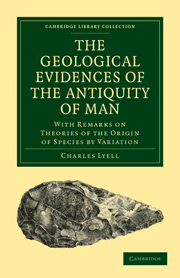 The Geological Evidences of the Antiquity of Man
The Geological Evidences of the Antiquity of Man Published online by Cambridge University Press: 29 August 2010
THE supposed existence, at a remote and unknown period, of a language conventionally called the Aryan, has of late years been a favourite subject of speculation among German philologists, and Professor Max Müller has given us lately the most improved version of this theory, and has set forth the various facts and arguments by which it may be defended, with his usual perspicuity and eloquence. He observes that if we knew nothing of the existence of Latin, — if all historical documents previous to the fifteenth century had been lost,—if tradition even was silent as to the former existence of a Roman empire, a mere comparison of the Italian, Spanish, Portuguese, French, Wallachian, and Rhœtian dialects would enable us to say that at some time there must have been a language, from which these six modern dialects derive their origin in common. Without this supposition it would be impossible to account for their structure and composition, as, for example, for the forms of the auxiliary verb ‘to be,’ all evidently varieties of one common type, while it is equally clear that no one of the six affords the original form from which the others could have been borrowed. So also in none of the six languages do we find the elements of which these verbal and other forms could have been composed; they must have been handed down as relics from a former period, they must have existed in some antecedent language, which we know to have been the Latin.
To save this book to your Kindle, first ensure no-reply@cambridge.org is added to your Approved Personal Document E-mail List under your Personal Document Settings on the Manage Your Content and Devices page of your Amazon account. Then enter the ‘name’ part of your Kindle email address below. Find out more about saving to your Kindle.
Note you can select to save to either the @free.kindle.com or @kindle.com variations. ‘@free.kindle.com’ emails are free but can only be saved to your device when it is connected to wi-fi. ‘@kindle.com’ emails can be delivered even when you are not connected to wi-fi, but note that service fees apply.
Find out more about the Kindle Personal Document Service.
To save content items to your account, please confirm that you agree to abide by our usage policies. If this is the first time you use this feature, you will be asked to authorise Cambridge Core to connect with your account. Find out more about saving content to Dropbox.
To save content items to your account, please confirm that you agree to abide by our usage policies. If this is the first time you use this feature, you will be asked to authorise Cambridge Core to connect with your account. Find out more about saving content to Google Drive.